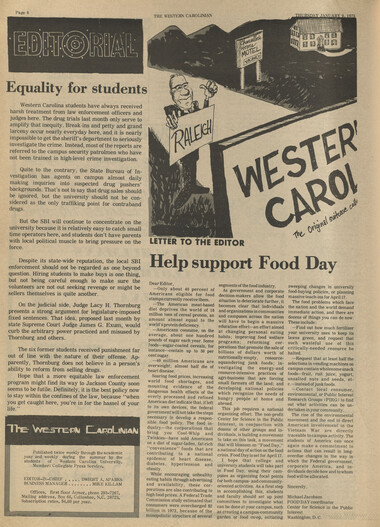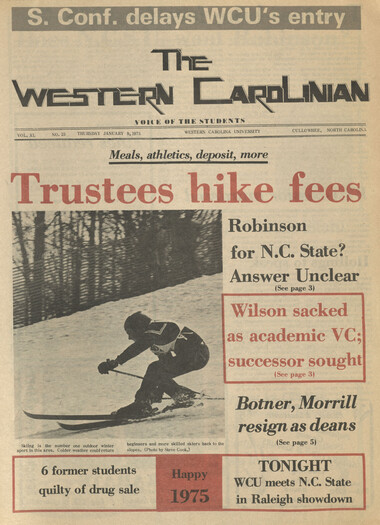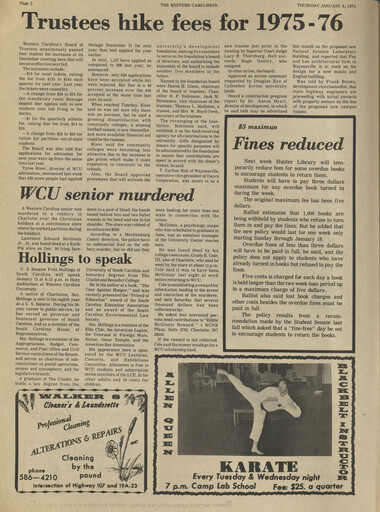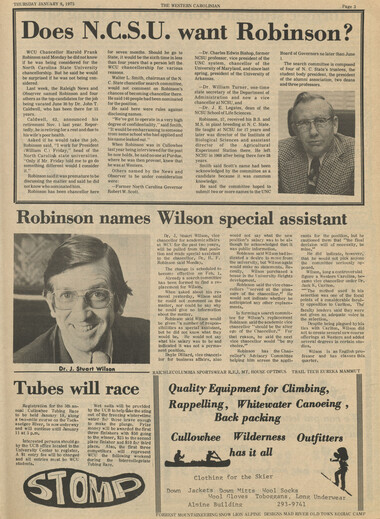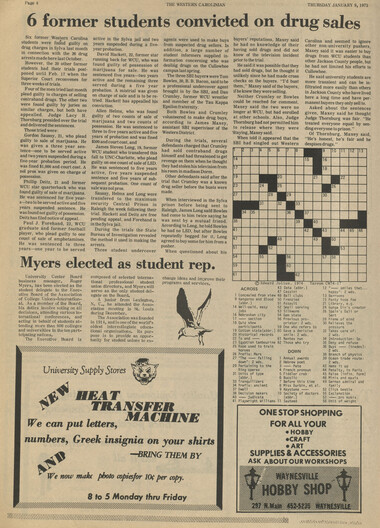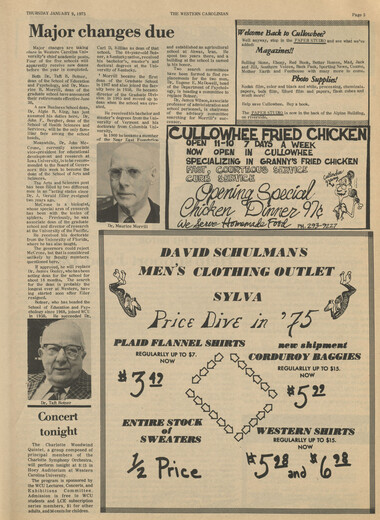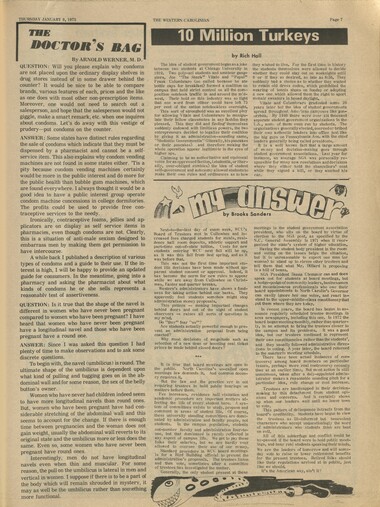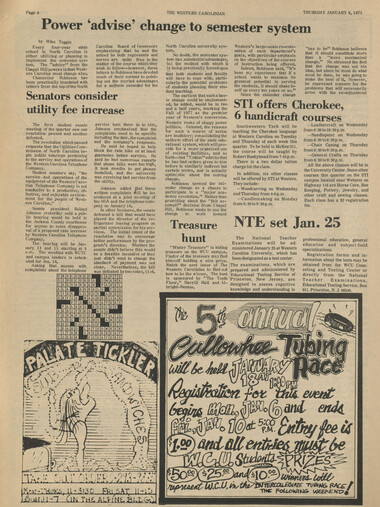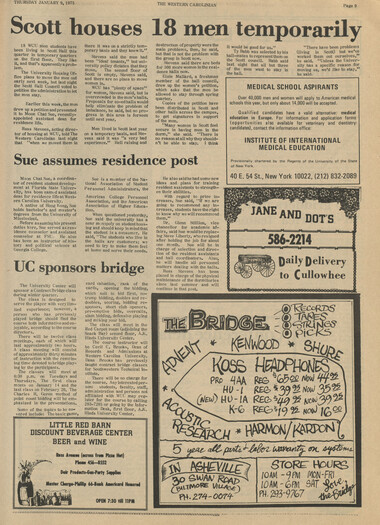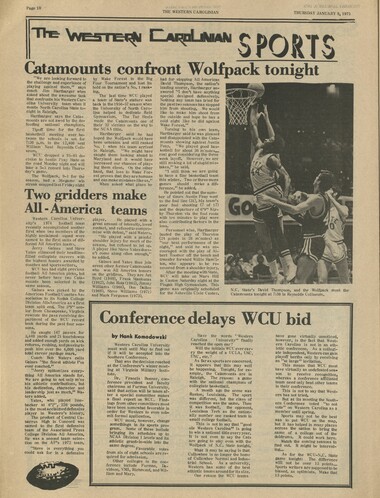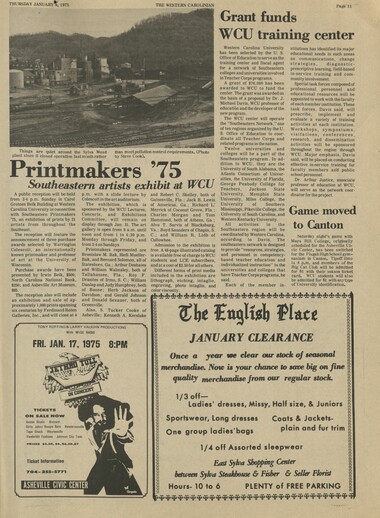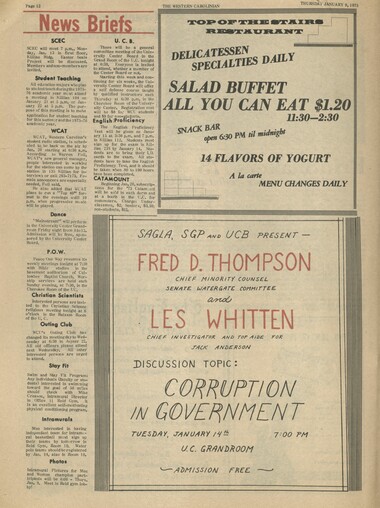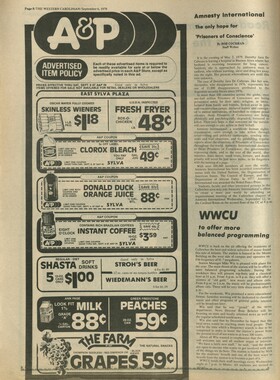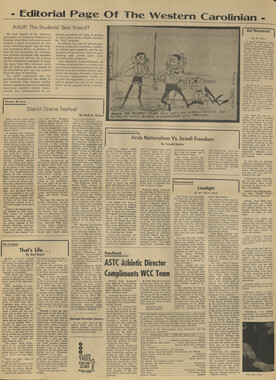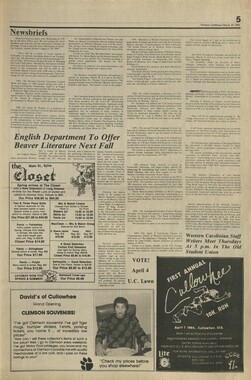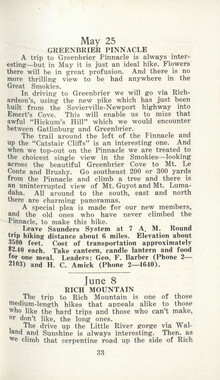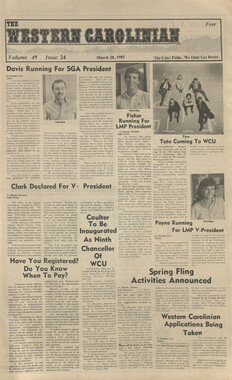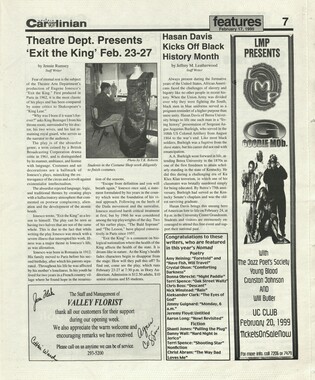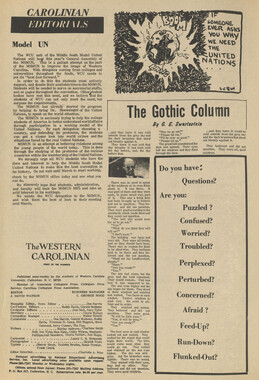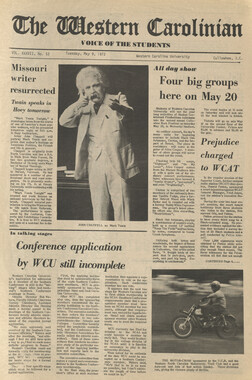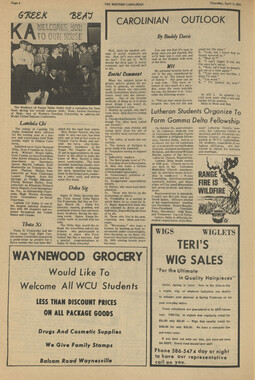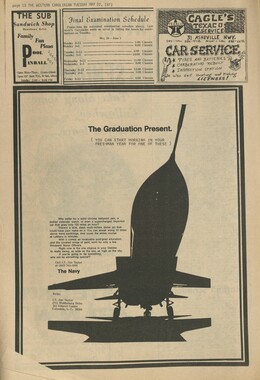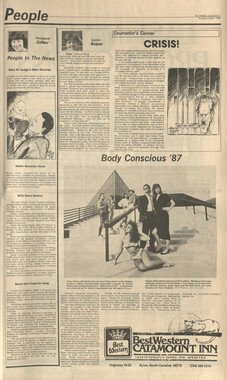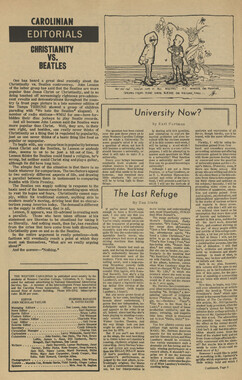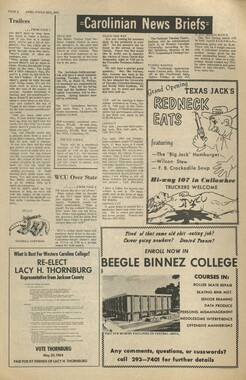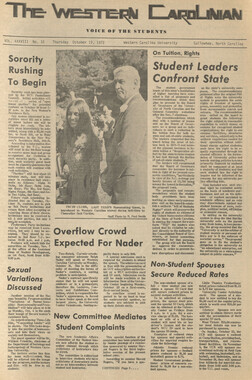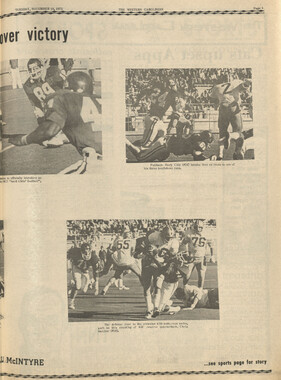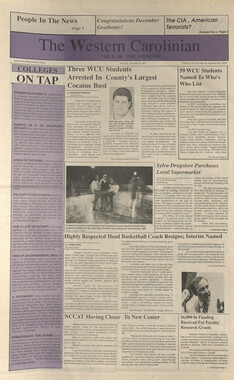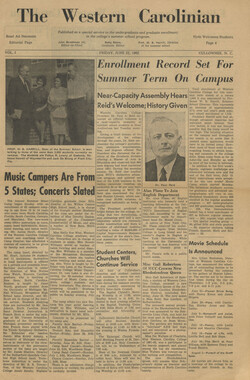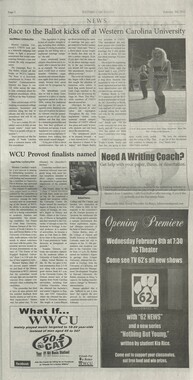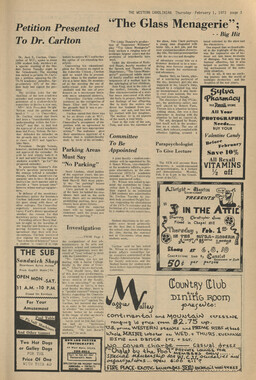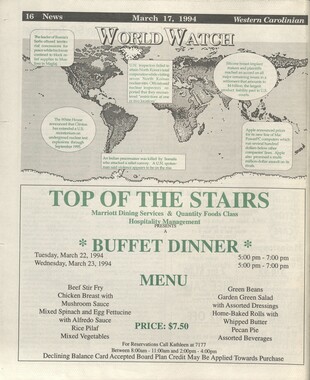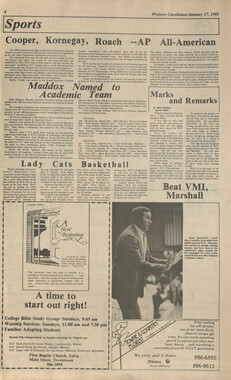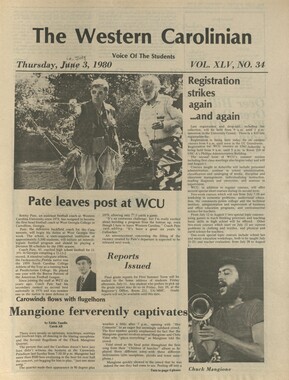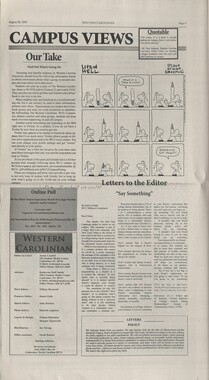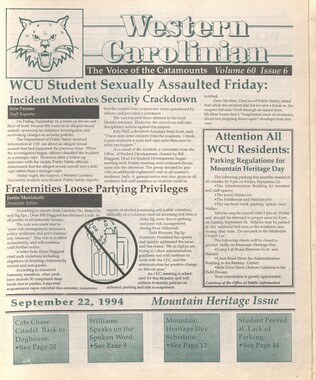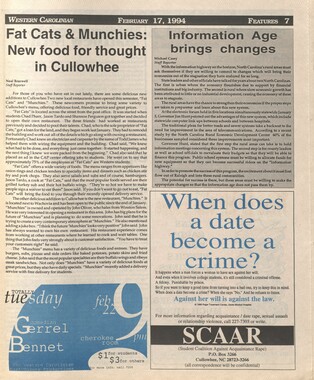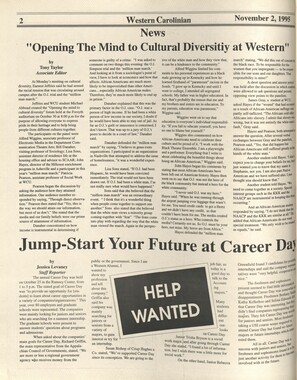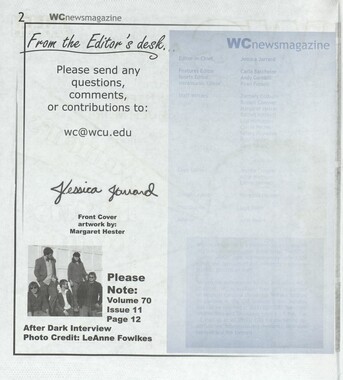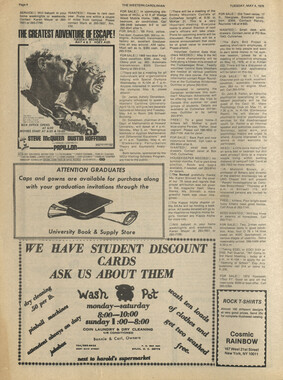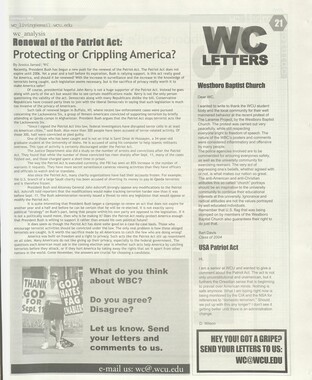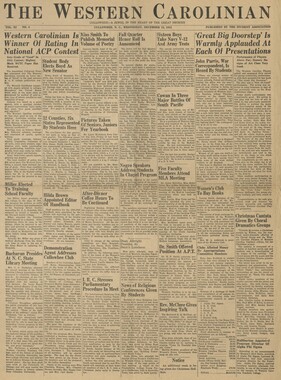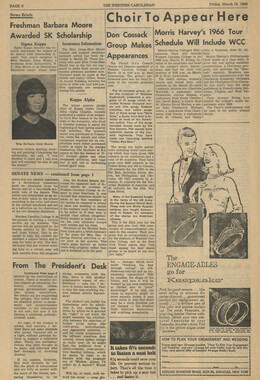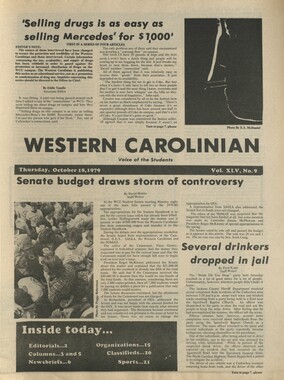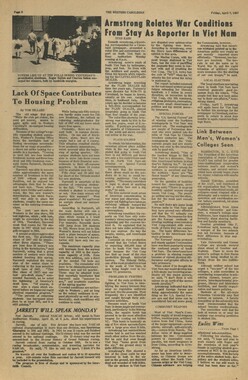Western Carolina University (21)
View all
- Canton Champion Fibre Company (2308)
- Cherokee Traditions (291)
- Civil War in Southern Appalachia (165)
- Craft Revival (1942)
- George Masa Collection (137)
- Great Smoky Mountains - A Park for America (3080)
- Highlights from Western Carolina University (422)
- Horace Kephart (973)
- Journeys Through Jackson (159)
- LGBTQIA+ Archive of Jackson County (89)
- Oral Histories of Western North Carolina (318)
- Picturing Appalachia (6617)
- Stories of Mountain Folk (413)
- Travel Western North Carolina (153)
- Western Carolina University Fine Art Museum Vitreograph Collection (129)
- Western Carolina University Herbarium (92)
- Western Carolina University: Making Memories (738)
- Western Carolina University Publications (2491)
- Western Carolina University Restricted Electronic Theses and Dissertations (146)
- Western North Carolina Regional Maps (71)
- World War II in Southern Appalachia (131)
University of North Carolina Asheville (6)
View all
- Allanstand Cottage Industries (62)
- Appalachian National Park Association (53)
- Bennett, Kelly, 1890-1974 (1463)
- Berry, Walter (76)
- Brasstown Carvers (40)
- Carver, George Washington, 1864?-1943 (26)
- Cathey, Joseph, 1803-1874 (1)
- Champion Fibre Company (233)
- Champion Paper and Fibre Company (297)
- Cherokee Indian Fair Association (16)
- Cherokee Language Program (22)
- Crowe, Amanda (40)
- Edmonston, Thomas Benton, 1842-1907 (7)
- Ensley, A. L. (Abraham Lincoln), 1865-1948 (275)
- Fromer, Irving Rhodes, 1913-1994 (70)
- George Butz (BFS 1907) (46)
- Goodrich, Frances Louisa (120)
- Grant, George Alexander, 1891-1964 (96)
- Heard, Marian Gladys (60)
- Kephart, Calvin, 1883-1969 (15)
- Kephart, Horace, 1862-1931 (313)
- Kephart, Laura, 1862-1954 (67)
- Laney, Gideon Thomas, 1889-1976 (439)
- Masa, George, 1881-1933 (61)
- McElhinney, William Julian, 1896-1953 (44)
- Niggli, Josephina, 1910-1983 (10)
- North Carolina Park Commission (105)
- Osborne, Kezia Stradley (9)
- Owens, Samuel Robert, 1918-1995 (11)
- Penland Weavers and Potters (36)
- Roberts, Vivienne (15)
- Roth, Albert, 1890-1974 (142)
- Schenck, Carl Alwin, 1868-1955 (1)
- Sherrill's Photography Studio (2565)
- Southern Highland Handicraft Guild (127)
- Southern Highlanders, Inc. (71)
- Stalcup, Jesse Bryson (46)
- Stearns, I. K. (213)
- Thompson, James Edward, 1880-1976 (226)
- United States. Indian Arts and Crafts Board (130)
- USFS (683)
- Vance, Zebulon Baird, 1830-1894 (1)
- Weaver, Zebulon, 1872-1948 (58)
- Western Carolina College (230)
- Western Carolina Teachers College (282)
- Western Carolina University (2008)
- Western Carolina University. Mountain Heritage Center (18)
- Whitman, Walt, 1819-1892 (10)
- Wilburn, Hiram Coleman, 1880-1967 (73)
- Williams, Isadora (3)
- Cain, Doreyl Ammons (0)
- Crittenden, Lorraine (0)
- Rhodes, Judy (0)
- Smith, Edward Clark (0)
- Appalachian Region, Southern (3032)
- Asheville (N.C.) (1945)
- Avery County (N.C.) (26)
- Blount County (Tenn.) (195)
- Buncombe County (N.C.) (1680)
- Cherokee County (N.C.) (283)
- Clay County (N.C.) (556)
- Graham County (N.C.) (238)
- Great Smoky Mountains National Park (N.C. and Tenn.) (525)
- Haywood County (N.C.) (3573)
- Henderson County (N.C.) (70)
- Jackson County (N.C.) (4925)
- Knox County (Tenn.) (35)
- Knoxville (Tenn.) (13)
- Lake Santeetlah (N.C.) (10)
- Macon County (N.C.) (421)
- Madison County (N.C.) (216)
- McDowell County (N.C.) (39)
- Mitchell County (N.C.) (135)
- Polk County (N.C.) (35)
- Qualla Boundary (982)
- Rutherford County (N.C.) (78)
- Swain County (N.C.) (2185)
- Transylvania County (N.C.) (270)
- Watauga County (N.C.) (12)
- Waynesville (N.C.) (86)
- Yancey County (N.C.) (72)
- Aerial Photographs (3)
- Aerial Views (60)
- Albums (books) (4)
- Articles (1)
- Artifacts (object Genre) (228)
- Bibliographies (1)
- Biography (general Genre) (2)
- Cards (information Artifacts) (38)
- Clippings (information Artifacts) (192)
- Copybooks (instructional Materials) (3)
- Crafts (art Genres) (622)
- Depictions (visual Works) (21)
- Design Drawings (1)
- Digital Moving Image Formats (2)
- Drawings (visual Works) (185)
- Envelopes (101)
- Exhibitions (events) (1)
- Facsimiles (reproductions) (1)
- Fiction (general Genre) (4)
- Financial Records (12)
- Fliers (printed Matter) (67)
- Glass Plate Negatives (381)
- Guidebooks (2)
- Internegatives (10)
- Interviews (823)
- Land Surveys (102)
- Letters (correspondence) (1045)
- Manuscripts (documents) (618)
- Maps (documents) (177)
- Memorandums (25)
- Minutes (administrative Records) (59)
- Negatives (photographs) (6090)
- Newsletters (1290)
- Newspapers (2)
- Notebooks (8)
- Occupation Currency (1)
- Paintings (visual Works) (1)
- Pen And Ink Drawings (1)
- Periodicals (194)
- Personal Narratives (10)
- Photographs (12977)
- Plans (maps) (1)
- Poetry (6)
- Portraits (4568)
- Postcards (329)
- Programs (documents) (181)
- Publications (documents) (2444)
- Questionnaires (65)
- Relief Prints (26)
- Sayings (literary Genre) (1)
- Scrapbooks (282)
- Sheet Music (2)
- Slides (photographs) (402)
- Songs (musical Compositions) (2)
- Sound Recordings (802)
- Specimens (92)
- Speeches (documents) (18)
- Tintypes (photographs) (8)
- Transcripts (329)
- Text Messages (0)
- A.L. Ensley Collection (275)
- Appalachian Industrial School Records (7)
- Appalachian National Park Association Records (336)
- Axley-Meroney Collection (2)
- Bayard Wootten Photograph Collection (20)
- Bethel Rural Community Organization Collection (7)
- Blumer Collection (5)
- C.W. Slagle Collection (20)
- Canton Area Historical Museum (2110)
- Carlos C. Campbell Collection (462)
- Cataloochee History Project (64)
- Cherokee Studies Collection (4)
- Daisy Dame Photograph Album (5)
- Daniel Boone VI Collection (1)
- Doris Ulmann Photograph Collection (112)
- Elizabeth H. Lasley Collection (1)
- Elizabeth Woolworth Szold Fleharty Collection (4)
- Frank Fry Collection (95)
- George Masa Collection (173)
- Gideon Laney Collection (452)
- Hazel Scarborough Collection (2)
- Hiram C. Wilburn Papers (28)
- Historic Photographs Collection (236)
- Horace Kephart Collection (861)
- Humbard Collection (33)
- Hunter and Weaver Families Collection (1)
- I. D. Blumenthal Collection (4)
- Isadora Williams Collection (4)
- Jesse Bryson Stalcup Collection (47)
- Jim Thompson Collection (224)
- John B. Battle Collection (7)
- John C. Campbell Folk School Records (80)
- John Parris Collection (6)
- Judaculla Rock project (2)
- Kelly Bennett Collection (1482)
- Love Family Papers (11)
- Major Wiley Parris Civil War Letters (3)
- Map Collection (12)
- McFee-Misemer Civil War Letters (34)
- Mountain Heritage Center Collection (4)
- Norburn - Robertson - Thomson Families Collection (44)
- Pauline Hood Collection (7)
- Pre-Guild Collection (2)
- Qualla Arts and Crafts Mutual Collection (12)
- R.A. Romanes Collection (681)
- Rosser H. Taylor Collection (1)
- Samuel Robert Owens Collection (94)
- Sara Madison Collection (144)
- Sherrill Studio Photo Collection (2558)
- Smoky Mountains Hiking Club Collection (616)
- Stories of Mountain Folk - Radio Programs (374)
- The Reporter, Western Carolina University (510)
- Venoy and Elizabeth Reed Collection (16)
- WCU Gender and Sexuality Oral History Project (36)
- WCU Mountain Heritage Center Oral Histories (25)
- WCU Oral History Collection - Mountain People, Mountain Lives (71)
- WCU Students Newspapers Collection (1923)
- Western North Carolina Tomorrow Black Oral History Project (69)
- William Williams Stringfield Collection (2)
- Zebulon Weaver Collection (109)
- African Americans (390)
- Appalachian Trail (35)
- Artisans (521)
- Cherokee art (84)
- Cherokee artists -- North Carolina (10)
- Cherokee language (21)
- Cherokee pottery (101)
- Cherokee women (208)
- Church buildings (190)
- Civilian Conservation Corps (U.S.) (111)
- College student newspapers and periodicals (2012)
- Dams (108)
- Dance (1023)
- Education (222)
- Floods (63)
- Folk music (1015)
- Forced removal, 1813-1903 (2)
- Forest conservation (220)
- Forests and forestry (1198)
- Gender nonconformity (4)
- Great Smoky Mountains National Park (N.C. and Tenn.) (181)
- Hunting (47)
- Landscape photography (25)
- Logging (122)
- Maps (83)
- Mines and mineral resources (9)
- North Carolina -- Maps (18)
- Paper industry (38)
- Postcards (255)
- Pottery (135)
- Railroad trains (72)
- Rural electrification -- North Carolina, Western (3)
- School integration -- Southern States (2)
- Segregation -- North Carolina, Western (5)
- Slavery (5)
- Sports (452)
- Storytelling (243)
- Waterfalls -- Great Smoky Mountains (N.C. and Tenn.) (66)
- Weaving -- Appalachian Region, Southern (280)
- Wood-carving -- Appalachian Region, Southern (328)
- World War, 1939-1945 (173)
Western Carolinian Volume 40 Number 25
Item
Item’s are ‘child’ level descriptions to ‘parent’ objects, (e.g. one page of a whole book).
-
-
Page 6 THE WESTERN CAROLINIAN Equality for students Western Carolina students have always received harsh treatment from law enforcement officers and judges here. The drug trials last month only serve to amplify that inequity. Break-ins and petty and grand larceny occur nearly everyday here, and it is nearly impossible to get the sheriff's department to seriously investigate the crime. Instead, most of the reports are referred to the campus security patrolmen who have not been trained in high-level crime investigation. Quite to the contrary, the State Bureau of Investigation has agents on campus almost daily making inquiries into suspected drug pushers' backgrounds. That's not to say that drug sales should be ignored, but the university should not be considered as the only traffiking point for contraband drugs. But the SBI will continue to concentrate on the university because it is relatively easy to catch small time operators here, and students don't have parents with local political muscle to bring pressure on the force. Despite its state-wide reputation, the local SBI enforcement should not be regarded as one beyond question. Hiring students to make buys is one thing, but not being careful enough to make sure the volunteers are not out seeking revenge or might be sellers themselves is quite another. On the judicial side, Judge Lacy H. Thornburg presents a strong argument for legislature-imposed fixed sentences. That idea, proposed last month by state Supreme Court Judge James G. Exum, would curb the arbitrary power practiced and misused by Thornburg and others. The six former students received punishment far out of line with the nature of their offense. Apparently, Thornburg does not believe in a person's ability to reform from selling drugs. Hope that a more equitable law enforcement program might find its way to Jackson County soon seems to be futile. Definitely, it is the best policy now to stay within the confines of the law, because "when you get caught here, you're in for the hassel of your life." llTmEr Vvf=S"TErPfc CaRdLiMIAM Published twice weekly through the academic year and weekly during the summer by the students of Western Carolina University. Member: Collegiate Press Service. EDITOR-IN-CHIEF . , BUSINESS MANAGER , DWIGHT A. SPARKS . . . . MIKE KILLAM Offices, first floor Joyner, phone 293-7267. Mailing address, Box 66, Cullowhee, N.C. 28723. Subscription rates, $4.00 per year. LETTER Help support Food Day Dear Editor, —Only about 40 percent of Americans eligible for food stamps currently receive them. —The American meat-based diet deprives the world of 18 million tons of cereal protein, an amount almost equal to the world's protein deficiency. —Americans consume, on the average, about one hundred pounds of sugar each year. Some foods—sugar-coated cereals, for instance—contain up to 50 per cent sugar. —40 million Americans are overweight; almost half die of heart disease. Soaring food prices, increasing world food shortages, and mounting evidence of the dangerous health effects of the overly processed and refined American diet indicate that, if left to its own devices, the federal government will not take the steps necessary to develop a responsible food policy. The food industry—the corporations that bring you Cool-Whip and Twinkies—have sold Americans on a diet of sugar-laden, fat-rich "convenience" foods that are contributing to a national epidemic of heart disease, diabetes, hypertension and obesity. While encouraging unhealthy eating habits through advertising and availability, these corporations are also contributing to high food prices. A Federal Trade Commission study estimated that consumers were overcharged $2 billion in 1972, because of the monopolistic structure of several segments of the food industry. As government and corporate decision-makers allow the food situation to deteriorate further, it becomes clear that individuals and organizations in communities and campuses across the nation will have to begin a massive education effort—an effort aimed at changing personal eating habits; improving food welfare programs; reforming corporations that promote the sale of billions of dollars worth of nutritionally-empty, resource- squandering junk foods; investigating the energy-and resource-intensive practices of agri-business that are forcing small farmers off the land; and developing national policies which recognize the needs of hungry people at home and abroad. This job requires a national organizing effort. The non-profit Center for Science in the Public Interest, in conjunction with dozens of other groups and individuals, is building a movement to take on this task, a movement that will blossom on "Food Day," a national day of action on the food crisis. Food Day is set for April 17. I hope that college and university.students will take part in Food Day, using their campuses as organizing focal points for both campus- and community- oriented activities. As a first step in accomplishing this, students and faculty should set up joint committees to investigate what can be done at your campus, such as creating a campus-community garden or food co-op, initiating sweeping changes in university food-buying policies, or planning massive teach-ins for April 17. The food problems which face the nation and the world demand immediate action, and there are dozens of things you can do now. These include: —Find out how much fertilizer your university uses to keep its lawns green, and request that such wasteful use of this critically-needed resource be halted. —Request that at least half the selections in vending machines on campus contain wholesome snack foods—fruit, ruit juice, yogurt, unsalted nuts and seeds, etc—instead of junk foods. —Contact local consumer, environmental, or Public Interest Research Groups (PIRG) to find out what activities can be undertaken in your community. The rise of the environmental movement and the end to direct American involvement in the Vietnam War are directly traceable to campus activity. The students of America can once again make a commitment to actions that can result in long- overdue changes in the way in which the Federal government, corporate America, and individuals decide how and to whom food will be allocated. Sincerely, Michael Jacobson FOOD DAY coordinator Center for Science in the Public Interest Washington, D.C.
Object
Object’s are ‘parent’ level descriptions to ‘children’ items, (e.g. a book with pages).
-
The Western Carolinian is Western Carolina University's student-run newspaper. The paper was published as the Cullowhee Yodel from 1924 to 1931 before changing its name to The Western Carolinian in 1933.
-
